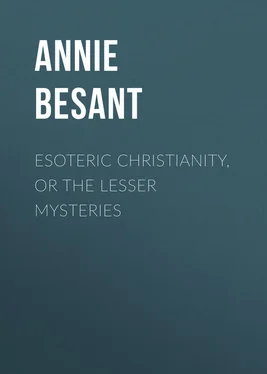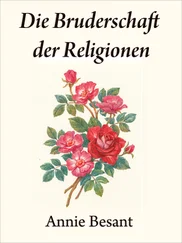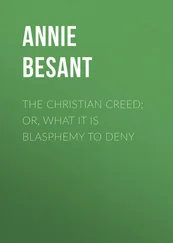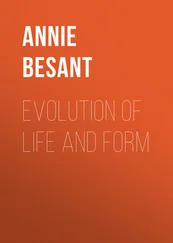Annie Besant - Esoteric Christianity, or The Lesser Mysteries
Здесь есть возможность читать онлайн «Annie Besant - Esoteric Christianity, or The Lesser Mysteries» — ознакомительный отрывок электронной книги совершенно бесплатно, а после прочтения отрывка купить полную версию. В некоторых случаях можно слушать аудио, скачать через торрент в формате fb2 и присутствует краткое содержание. Жанр: foreign_antique, foreign_prose, на английском языке. Описание произведения, (предисловие) а так же отзывы посетителей доступны на портале библиотеки ЛибКат.
- Название:Esoteric Christianity, or The Lesser Mysteries
- Автор:
- Жанр:
- Год:неизвестен
- ISBN:нет данных
- Рейтинг книги:5 / 5. Голосов: 1
-
Избранное:Добавить в избранное
- Отзывы:
-
Ваша оценка:
- 100
- 1
- 2
- 3
- 4
- 5
Esoteric Christianity, or The Lesser Mysteries: краткое содержание, описание и аннотация
Предлагаем к чтению аннотацию, описание, краткое содержание или предисловие (зависит от того, что написал сам автор книги «Esoteric Christianity, or The Lesser Mysteries»). Если вы не нашли необходимую информацию о книге — напишите в комментариях, мы постараемся отыскать её.
Esoteric Christianity, or The Lesser Mysteries — читать онлайн ознакомительный отрывок
Ниже представлен текст книги, разбитый по страницам. Система сохранения места последней прочитанной страницы, позволяет с удобством читать онлайн бесплатно книгу «Esoteric Christianity, or The Lesser Mysteries», без необходимости каждый раз заново искать на чём Вы остановились. Поставьте закладку, и сможете в любой момент перейти на страницу, на которой закончили чтение.
Интервал:
Закладка:
So much of theory we lay down as bearing on the necessity of a hidden side in all religions. When from theory we turn to facts, we naturally ask: Has this hidden side existed in the past, forming a part of the religions of the world? The answer must be an immediate and unhesitating affirmative; every great religion has claimed to possess a hidden teaching, and has declared that it is the repository of theoretical mystic, and further of practical mystic, or occult, knowledge. The mystic explanation of popular teaching was public, and expounded the latter as an allegory, giving to crude and irrational statements and stories a meaning which the intellect could accept. Behind this theoretical mysticism, as it was behind the popular, there existed further the practical mysticism, a hidden spiritual teaching, which was only imparted under definite conditions, conditions known and published, that must be fulfilled by every candidate. S. Clement of Alexandria mentions this division of the Mysteries. After purification, he says, "are the Minor Mysteries, which have some foundation of instruction and of preliminary preparation for what is to come after; and the Great Mysteries, in which nothing remains to be learned of the universe, but only to contemplate and comprehend nature and things." 9 9 Ante-Nicene Library, Vol. XII. Clement of Alexandria. Stromata , bk. V., ch. xi.
This position cannot be controverted as regards the ancient religions. The Mysteries of Egypt were the glory of that ancient land, and the noblest sons of Greece, such as Plato, went to Saïs and to Thebes to be initiated by Egyptian Teachers of Wisdom. The Mithraic Mysteries of the Persians, the Orphic and Bacchic Mysteries and the later Eleusinian semi-Mysteries of the Greeks, the Mysteries of Samothrace, Scythia, Chaldea, are familiar in name, at least, as household words. Even in the extremely diluted form of the Eleusinian Mysteries, their value is most highly praised by the most eminent men of Greece, as Pindar, Sophocles, Isocrates, Plutarch, and Plato. Especially were they regarded as useful with regard to post-mortem existence, as the Initiated learned that which ensured his future happiness. Sopater further alleged that Initiation established a kinship of the soul with the divine Nature, and in the exoteric Hymn to Demeter covert references are made to the holy child, Iacchus, and to his death and resurrection, as dealt with in the Mysteries. 10 10 See Article on "Mysteries," Encyc. Britannica ninth edition.
From Iamblichus, the great theurgist of the third and fourth centuries A.D., much may be learned as to the object of the Mysteries. Theurgy was magic, "the last part of the sacerdotal science," 11 11 Psellus, quoted in Iamblichus on the Mysteries . T. Taylor, p. 343, note on p. 23, second edition.
and was practised in the Greater Mysteries, to evoke the appearance of superior Beings. The theory on which these Mysteries were based may be very briefly thus stated: There is One, prior to all beings, immovable, abiding in the solitude of His own unity. From That arises the Supreme God, the Self-begotten, the Good, the Source of all things, the Root, the God of Gods, the First Cause, unfolding Himself into Light. 12 12 Iamblichus , as ante , p. 301.
From Him springs the Intelligible World, or ideal universe, the Universal Mind, the Nous and the incorporeal or intelligible Gods belong to this. From this the World-Soul, to which belong the "divine intellectual forms which are present with the visible bodies of the Gods." 13 13 Ibid. , p. 72.
Then come various hierarchies of superhuman beings, Archangels, Archons (Rulers) or Cosmocratores, Angels, Daimons, &c. Man is a being of a lower order, allied to these in his nature, and is capable of knowing them; this knowledge was achieved in the Mysteries, and it led to union with God. 14 14 The article on "Mysticism" in the Encyclopædia Britannica has the following on the teaching of Plotinus (204-206 A.D.): "The One [the Supreme God spoken of above] is exalted above the nous and the 'ideas'; it transcends existence altogether and is not cognisable by reason. Remaining itself in repose, it rays out, as it were, from its own fulness, an image of itself, which is called nous , and which constitutes the system of ideas of the intelligible world. The soul is in turn the image or product of the nous , and the soul by its motion begets corporeal matter. The soul thus faces two ways – towards the nous , from which it springs, and towards the material life, which is its own product. Ethical endeavour consists in the repudiation of the sensible; material existence is itself estrangement from God… To reach the ultimate goal, thought itself must be left behind; for thought is a form of motion, and the desire of the soul is for the motionless rest which belongs to the One. The union with transcendent deity is not so much knowledge or vision as ecstasy, coalescence, contact ." Neo-Platonism is thus "first of all a system of complete rationalism; it is assumed, in other words, that reason is capable of mapping out the whole system of things. But, inasmuch as a God is affirmed beyond reason, the mysticism becomes in a sense the necessary complement of the would-be all-embracing rationalism. The system culminates in a mystical act."
In the Mysteries these doctrines are expounded, "the progression from, and the regression of all things to, the One, and the entire domination of the One," 15 15 Iamblichus , as ante , p. 73.
and, further, these different Beings were evoked, and appeared, sometimes to teach, sometimes, by Their mere presence, to elevate and purify. "The Gods," says Iamblichus, "being benevolent and propitious, impart their light to theurgists in unenvying abundance, calling upwards their souls to themselves, procuring them a union with themselves, and accustoming them, while they are yet in body, to be separated from bodies, and to be led round to their eternal and intelligible principle." 16 16 Ibid , pp. 55, 56.
For "the soul having a twofold life, one being in conjunction with body, but the other being separate from all body," 17 17 Ibid , pp. 118, 119.
it is most necessary to learn to separate it from the body, that thus it may unite itself with the Gods by its intellectual and divine part, and learn the genuine principles of knowledge, and the truths of the intelligible world. 18 18 Ibid , p. 118, 119.
"The presence of the Gods, indeed, imparts to us health of body, virtue of soul, purity of intellect, and, in one word, elevates everything in us to its proper nature. It exhibits that which is not body as body to the eyes of the soul, through those of the body." 19 19 Ibid , pp. 95, 100.
When the Gods appear, the soul receives "a liberation from the passions, a transcendent perfection, and an energy entirely more excellent, and participates of divine love and an immense joy." 20 20 Ibid , p. 101.
By this we gain a divine life, and are rendered in reality divine. 21 21 Ibid , p. 330.
The culminating point of the Mysteries was when the Initiate became a God, whether by union with a divine Being outside himself, or by the realisation of the divine Self within him. This was termed ecstasy, and was a state of what the Indian Yogî would term high Samâdhi, the gross body being entranced and the freed soul effecting its own union with the Great One. This "ecstasy is not a faculty properly so called, it is a state of the soul, which transforms it in such a way that it then perceives what was previously hidden from it. The state will not be permanent until our union with God is irrevocable; here, in earth life, ecstasy is but a flash… Man can cease to become man, and become God; but man cannot be God and man at the same time." 22 22 G. R. S. Mead. Plotinus , p. 42.
Plotinus states that he had reached this state "but three times as yet."
Интервал:
Закладка:
Похожие книги на «Esoteric Christianity, or The Lesser Mysteries»
Представляем Вашему вниманию похожие книги на «Esoteric Christianity, or The Lesser Mysteries» списком для выбора. Мы отобрали схожую по названию и смыслу литературу в надежде предоставить читателям больше вариантов отыскать новые, интересные, ещё непрочитанные произведения.
Обсуждение, отзывы о книге «Esoteric Christianity, or The Lesser Mysteries» и просто собственные мнения читателей. Оставьте ваши комментарии, напишите, что Вы думаете о произведении, его смысле или главных героях. Укажите что конкретно понравилось, а что нет, и почему Вы так считаете.











